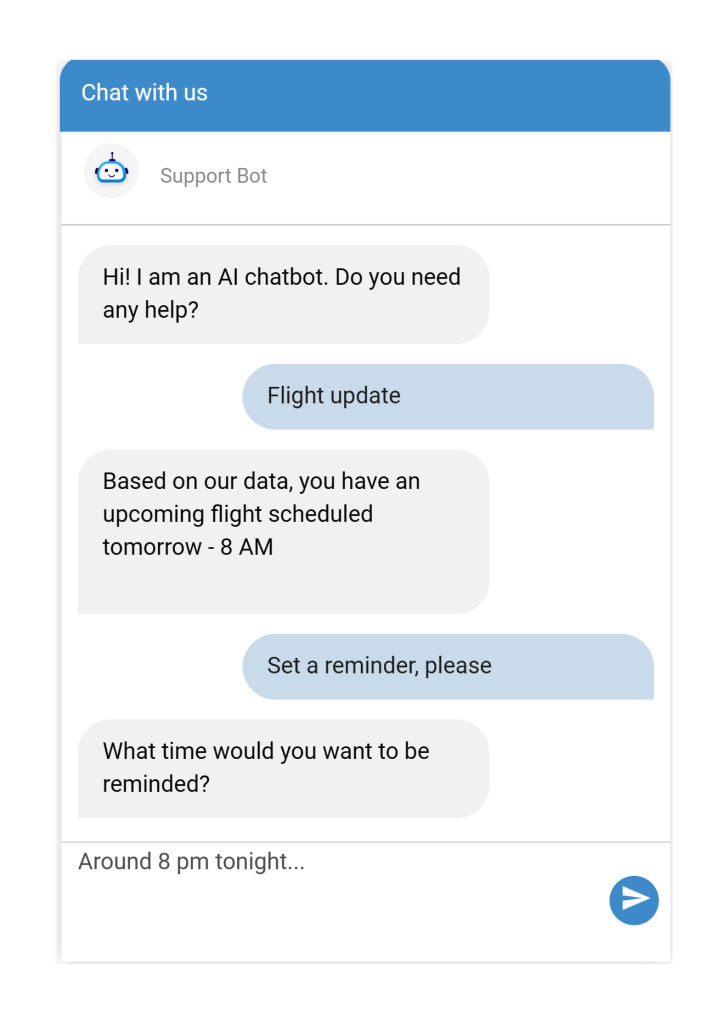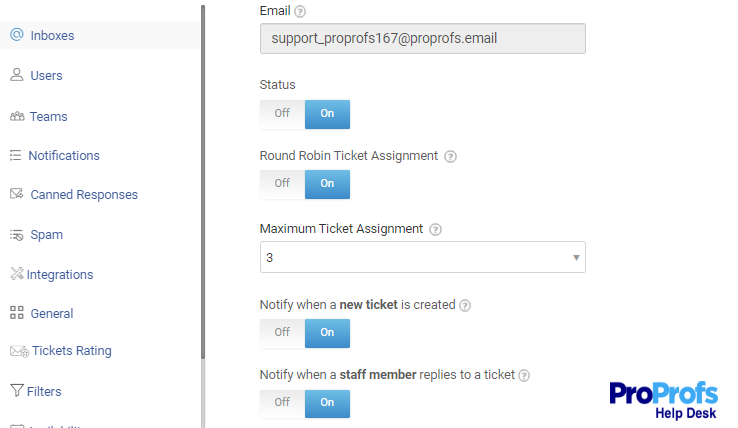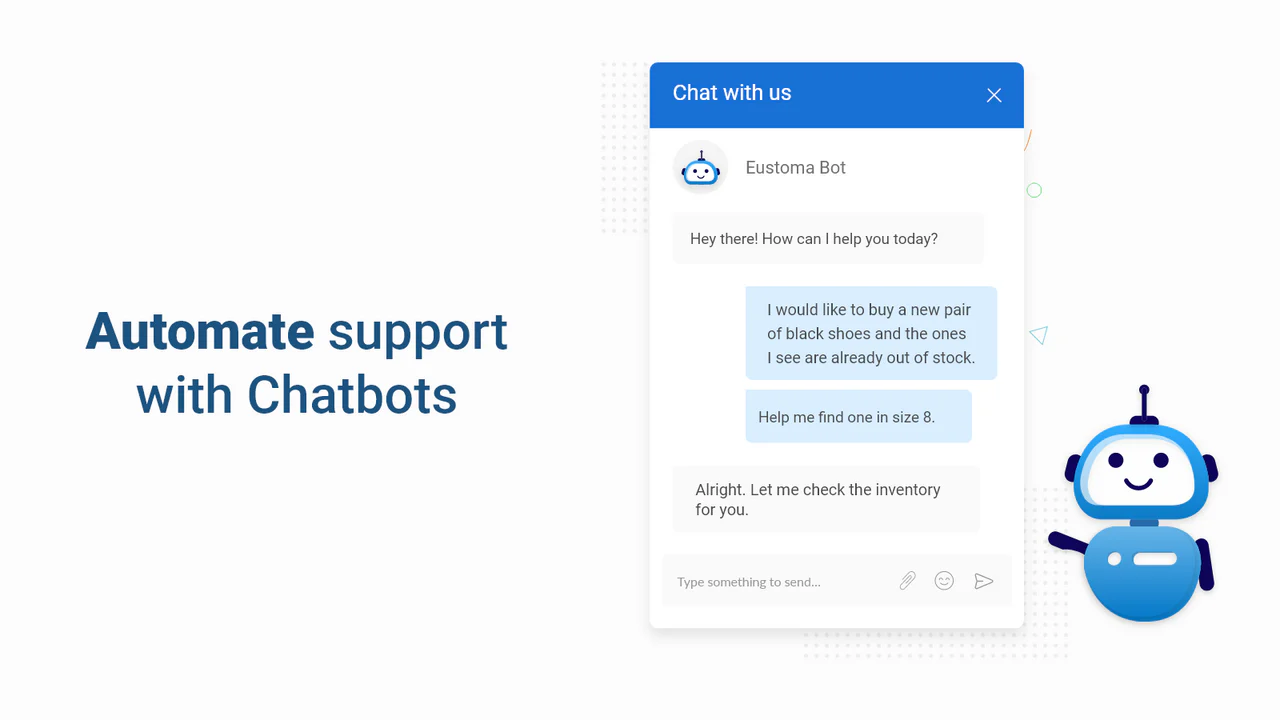Have you ever wondered what’s behind the curtain of modern, seamless customer service?
It’s not magic, it’s AI!
By integrating AI in customer service, businesses can provide more efficient and personalized interactions.
Gone are the days when AI was merely a vision of the future; today, it’s the reality enhancing our daily experiences. From mind-reading chatbots to services that feel crafted just for you, AI is transforming customer service into something out of a dream.
In this blog post, we’ll explore the benefits of AI-powered customer service, the challenges it presents, and the exciting opportunities it holds for the future.
So, let’s dive in.
What Is AI in Customer Service?
AI in customer service is about using technology to help businesses interact with customers more easily. Tools like chatbots, voice agents or virtual assistants are designed to answer questions and solve problems. These systems can handle simple requests, allowing customers to get quick help.
By using AI, companies can provide support at any time of day, even when human agents aren’t available. AI can look at past interactions to understand what customers need, making responses more helpful. This leads to a smoother and faster experience for everyone.
AI also helps companies keep costs down while offering better support. It can take care of basic tasks, so human agents can focus on more difficult problems. Over time, these systems are likely to get even better at assisting customers.
What Are the Benefits of AI in Customer Service?
Using AI for customer support provides a wide range of advantages that not only improve operational efficiency but also upgrade the overall customer experience. Let’s dive deeper into the benefits:
1. Faster Responses
AI-powered chatbots, virtual assistants, and AI agents can handle basic customer inquiries immediately, delivering fast responses without delays. This means customers don’t have to wait on hold or send an email and wait for a reply.
Whether it’s checking the status of an order, verifying product details, or addressing common concerns, AI ensures that customers get the information they need in just a few seconds, helping businesses improve their response time drastically.
2. Around-the-Clock Assistance
An impressive aspect of AI-based customer support is its ability to provide assistance round-the-clock. AI-powered tools can offer support at all hours, even during holidays or weekends, when human agents might be unavailable.
Customers can engage with chatbots or virtual assistants whenever it’s convenient for them, whether they are in different time zones or simply need help outside of business hours, leading to increased satisfaction and loyalty.
3. Cost Savings
AI helps businesses reduce customer service costs by handling repetitive and time-consuming tasks that would otherwise require additional human staff. Simple tasks like answering FAQs, helping customers navigate a website, or providing automated updates can be efficiently managed by AI.
By automating these processes, businesses can maintain high service levels without the need to hire more personnel, which ultimately lowers operational expenses and increases profitability.
4. Consistent Support
Unlike human agents who may have varying levels of energy, mood, or focus, AI delivers consistent, high-quality support every single time. Artificial intelligence in customer service systems follows the same procedures and guidelines to handle customer inquiries, ensuring that responses are always accurate and dependable.
No matter how many customers reach out or when they do, they can expect the same level of service, which builds trust and reliability between the customer and the brand.
5. Personalized Interactions
AI can learn from each customer interaction and tailor its responses to better suit individual needs. By analyzing past conversations, purchases, or browsing behavior, AI can offer personalized suggestions, proactive support, or reminders that make the customer feel understood and valued.
For instance, if a customer frequently asks about a particular product, the AI can offer related recommendations or promotions, creating a more relevant and engaging customer experience.
6. Scalability
AI systems are highly scalable, meaning they can easily handle a large volume of customer inquiries, especially during peak periods or product launches.
Unlike human agents who may struggle to keep up with a sudden surge in demand, AI can seamlessly manage hundreds or even thousands of requests simultaneously.
This ensures that every customer receives timely assistance without the risk of delays or bottlenecks, even during busy times.
7. Better Insights
AI continuously tracks customer interactions, gathering valuable data that businesses can use to improve their operations. AI analyzes customer trends to help companies improve, optimize products, and make informed decisions.
For example, if a common issue or question arises frequently, businesses can address it by refining their processes or updating FAQs to reduce the strain on customer service teams.
8. Reduces Human Error
AI systems are designed to follow strict protocols, reducing the chances of mistakes that can occur with human intervention. AI delivers reliable, error-free responses, whether providing shipping details, product recommendations, or resolving technical issues.
This consistency not only builds customer trust but also enhances the brand’s reputation for delivering high-quality, accurate information, every time a customer reaches out.
What Are the Challenges of AI in Customer Service?
While AI can greatly improve customer service, there are several challenges businesses need to overcome to make the most of it. Addressing these issues is key to maximizing its potential.
1. Understanding Complex Requests
AI systems often find it difficult to handle complex or highly detailed customer inquiries. Unlike human agents who can understand the subtleties of a situation, AI may miss nuances, tone, or context that are crucial for a complete answer.
As a result, when customers present complicated problems, AI may not be able to process the details accurately, leading to incorrect, incomplete, or irrelevant responses. This can frustrate customers who expect clear, thoughtful solutions.
2. Customer Trust
Many customers are still hesitant to engage with AI-powered systems because they may feel that AI can’t fully understand or resolve their problems the way a human can.
Building customer trust in AI requires careful design, transparency, and constant improvements to ensure that AI offers useful, relevant, and personalized responses.
Customers might worry that their issues will be misunderstood, leading them to seek human agents instead, which can hinder the effectiveness of AI systems in customer service.
3. Training AI Properly
For AI to respond effectively to customer inquiries, it needs to be trained on large, accurate, and varied data. If the AI is trained on insufficient or biased data, it may struggle to recognize different customer issues and provide incorrect or irrelevant responses.
Furthermore, the process of training AI requires continuous updates to adapt to new issues and patterns. AI requires regular maintenance and retraining to stay effective, so businesses must invest in continuous learning for optimal performance.
4. Personalization Limits
While AI systems can offer fast and efficient solutions to common customer queries, they often lack the ability to personalize responses in the same way a human agent can.
Humans can adjust their tone, empathy, and approach based on each customer’s needs, while AI typically relies on pre-programmed patterns and scripts.
This makes AI less effective at handling sensitive or unique situations where personalization and a human touch are needed. Without deep personalization, customers might feel that their needs are not truly understood or addressed.
5. Integration Issues
Integrating customer service artificial intelligence tools into existing systems like CRMs, helpdesks, or databases can be technically complex and costly.
Businesses may encounter challenges in ensuring AI systems work seamlessly with other tools, potentially causing data silos or information flow disruptions.
Smooth integration requires careful planning, technical expertise, and significant investment, which can be a challenge for some organizations.
6. Cost of Implementation
AI improves efficiency and reduces costs, but initial implementation can be costly. Businesses need to invest in systems, integration, and ongoing maintenance.
For smaller businesses with limited budgets, the upfront financial commitment may seem prohibitive, despite the promise of long-term savings.
The high cost of AI implementation could be a barrier to entry for companies that might benefit from automation but are unable to invest in the necessary technology.
What Are the Top Ways Customer Service Teams Use AI?
Customer support with AI is helping service teams boost efficiency and enhance customer interactions. By using AI tools, businesses can address more customer needs while streamlining operations for better performance. Here are six ways AI is benefiting customer service teams:
1. Automating Common Queries
AI chatbots can handle a wide range of repetitive customer inquiries, such as store hours, product details, return policies, or order status updates.
By automating these common questions, AI can provide instant responses, allowing customer service agents to focus on more complex or unique issues that require a human touch.
This results in quicker resolutions for simple queries and improves overall team efficiency, allowing businesses to serve more customers without compromising quality.
2. 24/7 Support
AI technology enables businesses to offer continuous support, even when human agents are not available. AI-powered chatbots or virtual assistants are always ready to engage with customers, regardless of the time of day.
This around-the-clock availability ensures that customers can always find assistance, whether it’s for general inquiries or urgent problems, helping businesses maintain high levels of customer satisfaction and loyalty.
With AI handling basic issues after hours, human agents can focus on more challenging cases during their working hours.
3. Personalized Recommendations

By analyzing customer data, such as browsing history, previous purchases, or even preferences shared in past conversations, AI can offer personalized product recommendations.
This not only makes the shopping experience more enjoyable but also increases the likelihood of cross-selling or up-selling.
For example, AI could suggest related products or complementary items based on a customer’s current interests, making it easier for them to find exactly what they need. As a result, businesses can drive more sales and create stronger, personalized connections with their customers.
4. Predicting Customer Needs
Customer support with AI helps teams work faster and improve interactions. AI tools allow businesses to meet more customer needs and simplify operations.
For example, if a customer frequently purchases a particular product or service, AI can recognize this pattern and proactively suggest replenishment options, updates, or new features that may be of interest.
By offering timely suggestions or reminders before customers even realize they need them, businesses can increase customer satisfaction, foster loyalty, and boost sales.
5. Efficient Ticket Management

AI helps streamline the process of managing customer service tickets by automatically categorizing and prioritizing them based on specific criteria, such as the urgency of the issue or the type of request.
AI can assess the content of each ticket and route it to the most appropriate agent or department, ensuring that critical issues are addressed first.
Automated ticket routing reduces the time agents spend manually sorting through tickets and helps ensure that customers get the help they need quickly.
FREE. All Features. FOREVER!
Try our Forever FREE account with all premium features!
How to Use AI in Customer Service
AI is transforming customer service by making interactions smoother and more efficient. It helps businesses respond faster and more accurately to customer needs. Here’s how AI can be used:
1. Chatbots

AI-powered chatbots are capable of engaging customers in real-time, answering a wide range of questions, and even resolving issues like tracking orders or resetting passwords. These chatbots can handle thousands of interactions simultaneously, offering consistent and quick responses that reduce wait times.
They are available round the clock, ensuring that customers can get help anytime, whether it’s early in the morning or late at night.
This significantly enhances the customer experience by providing instant assistance without the need to wait for a human agent.
2. Augmented Messaging
Augmented messaging uses AI to assist customer service agents by suggesting responses or automating some parts of the conversation. For instance, AI can suggest pre-written responses based on the customer’s inquiry, or it might recommend specific actions for the agent to take.
This helps reduce ticket response time and ensures that the agent can handle multiple inquiries at once. Moreover, the AI can spot patterns in customer questions and suggest effective responses, leading to more accurate and helpful conversations with customers.
3. Sentiment Analysis
Sentiment analysis involves using AI to evaluate the emotions of a customer during their interaction, whether it’s a chat, email, or phone call. AI analyzes customer language, tone, and context to identify emotions like frustration, happiness, confusion, or neutrality.
This information helps customer service teams tailor their responses accordingly, ensuring that the tone of the conversation matches the customer’s emotional state.
By identifying unhappy customers early, businesses can take corrective actions to turn the experience around, enhancing customer satisfaction.
4. Request Routing and Prioritization
AI helps improve request handling by automatically sorting incoming customer inquiries based on urgency or importance. For example, if a customer reports a technical issue with a critical service, AI can route the request directly to the technical team, bypassing other departments that may not be able to assist.
AI can also prioritize requests based on factors like customer status (e.g., VIP clients or high-value accounts) or the complexity of the issue, ensuring that more pressing concerns are addressed first.
This not only reduces response times but also optimizes the workflow of customer service teams.
5. Self-Service Resources
AI enables the creation of powerful self-service options, such as FAQs, knowledge bases, or interactive guides. These resources are designed to help customers find answers to common issues without needing to contact a support agent.
AI enhances these resources by making them more dynamic, allowing them to adapt based on customer queries and feedback.
For example, if customers frequently ask the same questions, AI can automatically update the FAQ section with more detailed answers, allowing future customers to solve their problems on their own.
6. Voice Analysis
Voice analysis technology powered by AI listens to the tone, speed, and pitch of a customer’s voice during phone calls. AI can detect frustration, confusion, or impatience, which can guide agents on how to adjust their responses accordingly.
For example, if the AI detects that a customer is upset, it may suggest a more empathetic response or flag the issue for immediate escalation to a higher-level support agent.
This ability to assess vocal tone and sentiment in real time enables businesses to offer a more compassionate and responsive customer experience.
7. Omnichannel Service
Omnichannel service refers to offering a seamless customer experience across multiple communication channels, such as live chat, social media, email, and phone calls. AI makes this possible by ensuring that customer data and history are synchronized across all channels.
This means that whether a customer starts a conversation on the website, continues it on social media, or follows up via email, the business has a full view of the interaction history and can provide a consistent response.
AI ensures that no matter how the customer chooses to engage, they get the same high-quality service, which builds trust and satisfaction.
8. Data Management
Managing large amounts of customer data can be overwhelming, but AI makes this process easier and more effective. AI systems can automatically organize and analyze vast amounts of customer data from emails, chats, and call logs.
This data can be used to create customer profiles, track behavior patterns, and predict future needs. For example, if a customer frequently contacts support about a specific issue, AI can flag this problem for proactive resolution.
By effectively managing and analyzing data, AI helps businesses make informed decisions, improve service quality, and drive customer loyalty.
9. Multilingual Support

AI-powered translation tools break down language barriers by providing support in multiple languages. Whether a customer is calling from another country or prefers to communicate in a different language, AI can instantly translate their inquiry and provide relevant responses.
This ensures that businesses can cater to a global audience without the need for a team of multilingual agents.
By offering multilingual support, businesses can expand their reach, enhance accessibility, and ensure that language is never a barrier to great customer service.
10. Machine Learning and Predictive Analytics
Machine learning and predictive analytics help businesses anticipate customer needs based on past behavior and data patterns. For example, AI might predict that a customer is likely to need assistance with renewing a subscription based on previous interactions.
AI can then offer proactive solutions, such as sending reminders or suggesting upgrades before the customer even asks.
This predictive capability allows businesses to stay ahead of customer needs and offer more personalized, tailored support, improving the overall customer experience and increasing satisfaction.
11. Automated Call Transcription
AI automatically transcribes customer calls into text, which can then be used for record-keeping, analysis, or training purposes. This saves time for human agents, who would otherwise need to manually document each conversation.
Additionally, transcriptions can be analyzed to identify common issues or frequently asked questions, allowing businesses to improve their knowledge base. Transcriptions also serve as valuable training tools for new agents, helping them understand how to handle different types of customer interactions.
AI’s ability to transcribe calls accurately ensures that businesses maintain detailed records and can easily reference past conversations when needed.
What Are the Factors to Consider Before Implementing AI for Customer Service?
Before you decide to implement AI for customer service, it’s important to consider a few key factors to ensure success. These factors will help you plan better and avoid common pitfalls.
1. Budget and Resources
The first step is to assess your budget and available resources. Implementing AI can be expensive, so it’s important to know how much you are willing to invest.
This includes not only the initial setup costs but also ongoing maintenance, updates, and potentially hiring new staff or training existing employees to manage the system.
Consider both direct and indirect costs, such as integration with existing tools and systems.
2. CX Expertise and Accuracy
Customer experience (CX) expertise is crucial to ensure the AI solution delivers the right results. You need to have a team with the right skills to design, implement, and continuously optimize the AI system.
The AI must be trained to understand various customer queries accurately and provide relevant responses. Without proper setup and expertise, the AI may end up delivering poor customer service, which could damage your reputation.
3. Time to Value
It’s important to understand how long it will take for AI to start delivering meaningful results. Some AI systems require months of training and refinement before they can deliver value.
This time can vary depending on your goals, the complexity of the AI, and how effectively it is integrated with existing systems.
You need to assess whether the time to value fits within your business’s strategic goals and customer service requirements.
4. Security
Security is another critical factor to consider. AI systems, especially those handling sensitive customer data, must meet strict security standards to protect that information.
Ensure that the AI platform adheres to data protection regulations such as GDPR or CCPA, depending on your location.
Additionally, AI systems should include safeguards to prevent data breaches and protect customer privacy, which is key to maintaining customer trust and compliance with legal requirements.
How to Integrate Artificial Intelligence and Customer Service?
Integrating artificial intelligence into customer service involves a systematic approach to ensure the AI can respond accurately and ethically. Here’s how you can achieve this:
1. Understand data types
The first step is to recognize the types of data that are important for the AI system. This includes understanding customer interactions like support tickets, emails, chats, reviews, and any other form of communication. Categorizing this data helps the AI identify the context of each query and respond appropriately.
2. Perform data structuring and labeling
After identifying the relevant data, the next task is to organize it into structured formats like databases or spreadsheets. Labeling this data is crucial for teaching the AI. For example, tagging a message as a billing inquiry or technical support helps the AI categorize future inquiries and respond accurately based on past examples.
3. Build support-specific intents
Now that your data is structured, define the key intents for customer support. These intents represent the specific needs customers typically have, such as asking about order status, product features, or troubleshooting issues. By focusing on these common queries, the AI can be trained to recognize them and give prompt, relevant responses.
4. Train the AI model on your proprietary data
Training the AI involves feeding it your structured and labeled data so that it can learn how to handle different scenarios. The AI learns from examples, so by using your own data, the system becomes more effective at understanding the unique aspects of your business, products, and services, ensuring more accurate responses.
5. Test and update AI
Once the AI model is trained, testing is essential to ensure it works correctly. Testing should be an ongoing process, using real customer interactions to identify areas where the AI may need improvement. Regularly updating the model with fresh data ensures it stays relevant as your products, services, and customer needs evolve.
6. Use AI ethically
Ethical considerations are important when implementing AI in customer service. The AI should be transparent in its responses, avoid biased or unfair answers, and handle customer data with respect and privacy. It’s essential to ensure that the AI system follows guidelines and regulations to protect customers’ sensitive information while providing valuable support.
The Future of AI in Customer Service
The evolution of AI in customer service is on an exciting trajectory, promising to reshape the landscape with innovations that offer both businesses and customers enhanced experiences and efficiencies. Here’s what the future holds:
1. Advanced Personalization
AI will enable hyper-personalized customer experiences by leveraging advanced data analytics and machine learning to understand customer preferences, behaviors, and needs.
Businesses can tailor every interaction, from recommending products to resolving queries, creating an experience that feels uniquely crafted for each individual.
This level of personalization will improve customer satisfaction and foster stronger brand loyalty.
2. Integration of AR & VR
The fusion of Augmented Reality (AR) and Virtual Reality (VR) with AI will transform customer service into an immersive and interactive experience. Customers can visualize products in their environment, participate in virtual walkthroughs, or receive step-by-step support in real-time.
For example, customers troubleshooting technical issues could use AR to get visual guidance from AI-powered assistants. This integration will bridge the gap between physical and digital experiences.
3. Seamless Human-AI Interaction
Advancements in natural language processing (NLP) will make AI interactions feel more human-like. Chatbots and virtual assistants will better understand context, tone, and sentiment, ensuring smooth and empathetic communication.
These improvements will allow AI to handle complex queries while seamlessly escalating to human agents when needed, creating a collaborative dynamic between digital and human support.
4. Proactive Service Delivery
AI’s predictive analytics capabilities will continue to evolve, enabling businesses to anticipate customer issues and address them before they escalate.
For instance, AI could identify potential subscription lapses, product malfunctions, or service interruptions and notify customers with solutions in advance.
This proactive approach will enhance customer trust and reduce the frustration of reactive problem-solving.
5. Enhanced Security with AI
As cyber threats become more sophisticated, AI will play a pivotal role in safeguarding customer data and interactions. AI algorithms will detect unusual patterns, prevent fraudulent activities, and provide real-time alerts to both businesses and customers.
For example, AI can monitor financial transactions for anomalies or identify potential data breaches, ensuring a secure and trustworthy environment for users.
These potential developments indicate a future where AI not only simplifies and enhances customer service processes but also creates more meaningful, secure, and personalized customer interactions.
FREE. All Features. FOREVER!
Try our Forever FREE account with all premium features!
8 Examples of AI in Customer Service
AI has significantly enhanced customer service by making interactions faster, more accurate, and personalized. Here are 8 examples of how AI is being used in customer service:
1. Chatbots
AI-powered chatbots handle various customer queries by providing instant responses, answering FAQs, booking appointments, and more.
By handling routine inquiries, chatbots allow human agents to focus on more complex issues, improving overall efficiency. They can operate 24/7, which means that even during off-hours, customers can get help.
Over time, chatbots can learn from previous interactions, improving their responses and becoming more effective in handling customer concerns.
2. Virtual Assistants
Virtual assistants, like Apple’s Siri, Amazon’s Alexa, and Google Assistant, represent a major leap in AI technology for customer service. These assistants can understand spoken language, allowing users to interact with devices in a more natural and intuitive way.
Customers can use virtual assistants to perform tasks such as placing orders, controlling smart home devices, setting reminders, or answering questions.
Businesses integrate these virtual assistants into their systems, enabling customers to easily access information or perform actions via voice commands, enhancing the customer experience with greater convenience.
3. Self-Service Portals
Self-service portals are increasingly powered by AI to provide customers with the tools they need to find solutions to common problems without the need to contact a customer service representative.
These portals can include AI-driven knowledge bases that suggest relevant articles or solutions based on the customer’s question. AI can also help guide customers through troubleshooting steps, address account issues, or update preferences, reducing the need for direct interaction.
This not only speeds up resolution times but also helps businesses manage a large volume of inquiries more effectively by empowering customers to help themselves.
4. Predictive Customer Support
Predictive customer support uses AI to analyze data from previous customer interactions to anticipate problems before they arise.
For instance, if a customer regularly contacts support about a particular issue, AI systems can predict that the customer might face the same issue again and proactively offer a solution, or even contact the customer with a resolution in advance.
This proactive approach helps businesses prevent issues from escalating and reduces customer frustration by solving problems before they occur. Additionally, predictive AI can help businesses identify patterns in customer behavior, allowing them to improve their services or products based on these insights.
5. Sentiment Analysis
AI-driven sentiment analysis tools can analyze text-based communication from customers—such as emails, chat messages, or social media posts—to determine the emotional tone behind the message. Whether a customer is expressing frustration, satisfaction, or neutrality, sentiment analysis helps businesses better understand customer needs.
For example, if a customer expresses anger, the AI system can flag the interaction for urgent attention, ensuring that the issue is addressed quickly.
This emotional insight allows businesses to tailor their responses, making them more empathetic and responsive, ultimately improving customer satisfaction and loyalty.
6. Voice Recognition
Voice recognition technology powered by AI is used in customer service to understand and respond to spoken language, particularly in call centers. This technology allows businesses to automate responses to customer requests over the phone and process them more efficiently.
AI can identify the customer’s query, match it to relevant data or scripts, and offer a solution without requiring human involvement.
For example, voice recognition systems can help customers check account balances, book appointments, or request information about services.
7. Personalized Recommendations
AI can analyze vast amounts of customer data, such as browsing history, purchase behavior, and search patterns, to provide highly personalized product or service recommendations. For instance, e-commerce platforms like Amazon use AI to suggest products based on a customer’s previous purchases or searches.
This personalization enhances the shopping experience by helping customers find relevant items more quickly, increasing the likelihood of a purchase. Additionally, AI can offer tailored content, such as promotions or offers, further improving engagement and sales.
By using AI to personalize customer interactions, businesses can create a more engaging and customer-centric experience.
8. Automated Ticketing Systems
Automated ticketing systems powered by AI streamline the process of managing customer support requests. When a customer submits an inquiry or issue, the AI system automatically generates a ticket and assigns it to the appropriate team or department.
AI can also categorize the issue based on urgency and complexity, ensuring that the most critical problems are addressed first. Additionally, AI can prioritize tickets, suggest resolutions based on similar past issues, and even offer solutions before human agents intervene.
This helps speed up response times, reduces the workload on support teams, and ensures customers receive timely assistance.
Upgrade Your Support Game with AI and Automation
AI-powered customer service is changing the way businesses support customers by offering faster responses, personalized experiences, and greater efficiency. But challenges like data privacy and system integration need attention.
To make the most of AI, businesses should choose tools that combine automation with human support for a smoother customer experience.
With ProProfs Help Desk, you get AI and automation features, such as customer intent analysis, response suggestions, and automated ticket routing, making customer support simple and efficient. It’s an easy way to improve your service and keep your customers happy while staying ahead in the market.
AI in Customer Service: FAQs
What industries benefit the most from AI in customer service?
Industries like e-commerce, telecommunications, banking, healthcare, and travel benefit most from AI by automating tasks and improving service efficiency.
Is AI going to replace customer service?
AI won’t fully replace customer service; it will handle routine tasks, but humans are still needed for complex or sensitive issues.
How can you keep your data secure when using AI for customer service?
Secure data by encrypting information, following privacy laws, and using AI systems that prioritize security and privacy.
Will AI create a fully automated customer service ecosystem?
AI will automate many tasks, but human agents will still be needed for complex issues, so a fully automated ecosystem isn’t likely.
FREE. All Features. FOREVER!
Try our Forever FREE account with all premium features!
 We'd love your feedback!
We'd love your feedback! Thanks for your feedback!
Thanks for your feedback!







